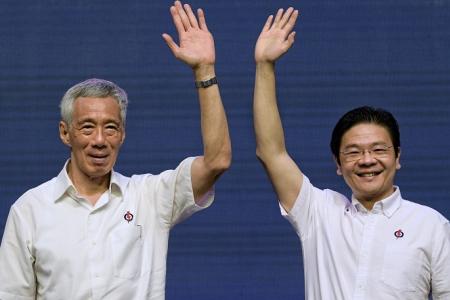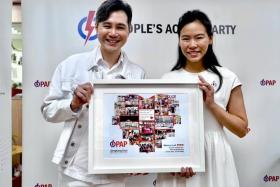PAP to renew leadership at party conference on Nov 24
All eyes are on the PAP this weekend as it gathers to renew its top decision-making body, paving the way for Prime Minister Lawrence Wong to become party chief ahead of Singapore’s next general election.
On Nov 24, the ruling party’s inner circle will choose its 38th Central Executive Committee (CEC), which is re-elected every two years at the biennial People’s Action Party conference.
Political observers expect Senior Minister Lee Hsien Loong to step down from the party’s top post of secretary-general, setting the stage for PM Wong to become party leader at the CEC’s next meeting. This is customarily held within a few weeks of the conference.
While the party’s CEC is not directly related to the Government, the 12 members elected this weekend will form the nucleus that will helm the PAP heading into the next general election, which must be held by November 2025.
Completing the transition from 3G to 4G
SM Lee could announce this weekend that he will be handing over the party’s reins, based on past precedent.
He became PAP secretary-general in November 2004, three months after being sworn in as the country’s third prime minister in August.
At that year’s PAP conference, then Senior Minister Goh Chok Tong stated his intention to step down as party chief.
Weeks later, in early December, the party announced that then Prime Minister Lee had been appointed as the new secretary-general following the new CEC’s first meeting.
This was a quicker timetable than the previous handover to Mr Goh from then Senior Minister Lee Kuan Yew.
The former became prime minister in November 1990, but assumed the post of party secretary-general only in 1992.
Emeritus Senior Minister Goh said he had initially wanted to take over the top party job in 1990, but felt that Mr Lee still had a role to play as secretary-general, and his continuing in the role would also recognise his contributions to the party and nation.
Political observers said this third transition is likely to play out in the same way as that between Mr Goh and SM Lee Hsien Loong, with PM Wong taking the PAP’s helm without delay.
Doing so would complete the transition from the third generation (3G) to fourth generation (4G) of leaders, given that PM Wong was sworn in as head of government in May, said Singapore Management University law don Eugene Tan.
Besides closing the loop on the succession process, Associate Professor Tan said, the party conference this weekend is significant for another reason: It would make clear that PM Wong, as leader of the 38th CEC, will lead the PAP into the upcoming election that is due within a year.
This is in line with what SM Lee had said at the last party convention in 2023.
At the time, he announced his intention to hand over before the next general election to PM Wong, who would then lead the party’s campaign to win his own mandate and take the country forward with the nation’s full backing.
Once PM Wong takes over, it will be the first time the PAP is led by a leader born post-independence, noted Prof Tan. PM Wong was born in 1972.
Both PM Wong and SM Lee are slated to speak at this year’s party conference, which is being held just days after the 70th anniversary of the PAP’s formation.
Prof Tan said that with this being the last party conference before the election, Singaporeans can expect PAP leaders to not only rally the party faithful, but also make the case to the rest of the electorate that the PAP is deserving of another firm mandate.
The two leaders will likely reflect on the party’s uninterrupted hold on the reins of power since 1959, and share more on how it intends to continue to lead Singapore in the years ahead, he added.
They may also appeal to Singaporeans to step forward to serve the country and its citizens, and issue a rallying cry to keep Singapore exceptional as it marks 60 years of independence in 2025.
PM Wong may also provide the broad contours of what will eventually be the PAP’s election manifesto.
Taken together, his speeches from his May swearing-in, August National Day Rally and the party conference, and his February 2025 Budget statement will be a quartet of key messaging ahead of the next general election, noted Prof Tan.
At its 50th and 60th anniversaries, the PAP had likewise made its case for Singaporeans’ continued support, while also marking the milestones with a series of celebratory events.
In 2004, the party capped off a year of golden jubilee events with a rally at the Singapore Indoor Stadium. In 2014, a 158-page book was launched at Victoria Concert Hall – the site where the party was formed in 1954.
CEC positions closely watched
The composition of the next CEC is likely to be largely similar to the current one, though observers said how the appointments shake out will be a strong signal on the line-up of the country’s leadership going forward.
“Many of the faces who serve as the 4G leadership have been rotated into the CEC over the years. They are likely to stay for some time yet, so I do not expect there to be major changes,” said NUS political scientist Chong Ja Ian.
Prof Tan agreed, highlighting that there are only two 3G leaders in the current CEC – SM Lee and Law and Home Affairs Minister K. Shanmugam.
Besides them and PM Wong, the other members of the 37th CEC are: Deputy Prime Minister Heng Swee Keat, Minister for Social and Family Development Masagos Zulkifli, Education Minister Chan Chun Sing, National Development Minister Desmond Lee, Health Minister Ong Ye Kung, Minister for Sustainability and the Environment Grace Fu, Minister for Culture, Community and Youth Edwin Tong, Minister in the Prime Minister’s Office Indranee Rajah, Minister for Digital Development and Information Josephine Teo, Manpower Minister Tan See Leng, Foreign Minister Vivian Balakrishnan, NTUC secretary-general Ng Chee Meng, Mr Alex Yeo and Ms Cheryl Chan.
Former Speaker of Parliament Tan Chuan-Jin had also been elected to the CEC, but resigned as an MP and from the PAP in 2023 after an affair with fellow MP Cheng Li Hui.
On Nov 24 – the second day of the conference – the PAP will announce the 12 members who have been elected via secret ballot by its cadres. The party typically co-opts another two members on the same day, customarily the next highest vote-getters. The CEC can co-opt another four members, which it typically does at its first meeting after the conference.
The office-bearers who will be most closely watched are the first and second assistant secretaries-general, said Prof Tan.
For decades, PAP MPs who held these positions were also concurrently the Republic’s deputy prime ministers – among them Dr Tony Tan, Mr Wong Kan Seng, Mr Teo Chee Hean and Mr Tharman Shanmugaratnam, before he became president.
Prof Tan said the assistant secretaries-general appointed at the new CEC’s first meeting would therefore signal strongly who will be PM Wong’s direct lieutenants in the years ahead.
DPM Gan Kim Yong is unlikely to contest a spot in the new CEC, given that he had retired as party chairman in 2022, said Prof Tan.
The party’s current assistant secretaries-general are Mr Chan and Mr Desmond Lee.
Prof Tan noted that Mr Chan is the only other 4G leader besides DPM Heng who has been an elected member of the CEC since 2012, while Mr Lee is seen as someone who has been effective in dealing with the concerns of public housing affordability and accessibility.
Another CEC member to watch is Mr Tong, who was made full minister in 2020, said Prof Tan.
He noted that Mr Tong probably had the highest profile in 2024 after PM Wong, having been closely involved in key events such as singer Taylor Swift’s concerts and Pope Francis’ visit here, the Paris Olympics, and the scuttled Income-Allianz deal.
Prof Tan said that given the PAP and the National Trades Union Congress’ symbiotic relationship, labour chief Ng is likely to continue to have a seat on the CEC.
“The larger point, or question, is who will be the DPMs after the upcoming GE,” he added.
Get The New Paper on your phone with the free TNP app. Download from the Apple App Store or Google Play Store now


